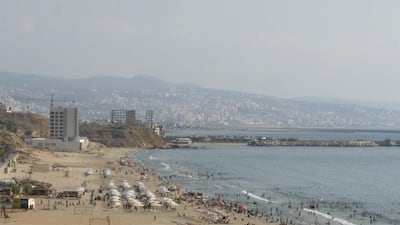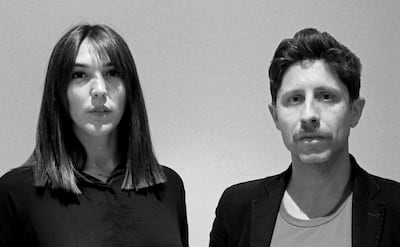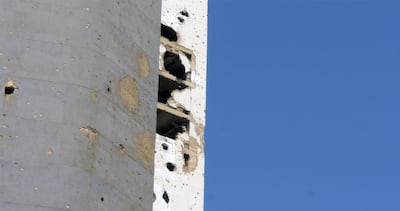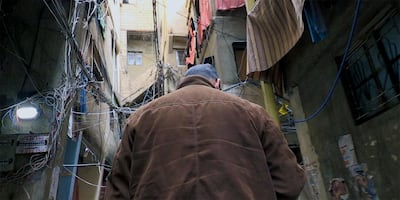Two hundred and fifty thousand dead, one million displaced and 17,000 people still missing: this is what people know from the Lebanese civil war, which lasted from 1975 to 1990 and deeply divided the country. What has been missing since then are the memories of the people who participated in or experienced the conflict. About A War lets three ex-fighters talk about their time during the clashes.
Filmed in Beirut, the feature-length documentary includes the testimonies of Assad, a right-wing Christian intelligence officer, Ahed, a Palestinian refugee and Nassim, a Communist commander, all fighting for different parties, against each other, during the civil war. The three describe the reasons behind their involvement in the war, peak moments of the conflict, and their regrets since the war officially ended with the Taif agreement in 1990. Without any common or public recollection of "the events" as Lebanese people call this time-frame, their testimonies allow the viewers to visualise three points of view and memories that, superposed, give a multiperspective picture of horrendous times.
Behind About A War are married couple, Daniele Rugo and Abi Weaver. Rugo is an Italian filmmaker and lecturer at Brunel University in London, and Weaver is a British former TV producer who is now studying for a PhD in film at The University of Surrey. Both met during their studies at Goldsmiths, University of London, and united their paths both professionally and personally.
In 2009 and 2010, the pair realised their first feature-length documentary, The Olympic Side of London, which focused on the transformation of East London before the Olympics of 2012 with a critical angle. "We are interested in conflicts and dialogue," Weaver tells The National. "For the Olympics, it was from the people's point of view. In About A War, we focused on former fighters."
About A War started as a collaboration with Lebanese sociologist Dana Abi Ghanem at Manchester University, which is working to explore the infrastructure of Lebanon and how it was impacted in Beirut by the civil war. The couple received a grant from the Arts and Humanities Research Council in the United Kingdom and started a three-year work project between Beirut and London, collecting testimonies from victims and aid agencies, as well as ex-fighters. "But the more we looked at how the infrastructure worked as a weapon of war, the more we became interested in the people behind this: the fighters," explains Rugo.
Assaad Chaftari, co-founder and vice-president of Beirut's NGO Fighters for Peace, introduced them to Nassim. Another NGO led the team to Ahed. "It's more a question of personal network," Weaver explains. "For Nassim and Assad, we talked more about their experience during the war, and while walking through Chatila [a Palestinian refugee camp in Beirut] to show us the electricity infrastructure, Ahed came to talk little by little about his own experience as well. So we decided to focus on that.
“So many things are still connected to the civil war, like the electricity that the fighters used to cut in some neighborhoods to put pressure on the opposite side,” Weaver adds. “Then all the other stories start to unravel. I think these former fighters are very brave to come forward because a lot are ashamed, it’s a very difficult process to speak up.”
Weaver and Rugo spent hours filming the three protagonists, whether just sitting, walking around and talking. Sometimes they filmed for eight hours straight, without intervening in their subjects’ speeches in order to let them express themselves fully in their own words. “We decided to use the ex-fighters’ stories to send a message and to educate, offer experiences on war, and form the idea that the truth of what happened is composed of many narratives,” Weaver says.
For example, in the movie, Nassim says: “I felt like the war came to me, and I felt like this war was my chance to change things. A chance to stop struggling in life and be done with feeling defeated all the time.” Rugo estimated that the lack of a shared narrative about the Lebanese civil war was preventing the country to recover: “People are rarely exposed to what other communities feel or have been exposed to. That’s why language is so important in the movie, where we spend more time with fighters talking than sensationalist footage: when memory is contested, language can weave it all.”
Their main goal with About A War was to show not yet another historical documentary, but to tackle the issue of how young people become mobilised and take up weapons in a war.
About A War will be screened at the Curzon Soho cinema in London tonight
______________________
Read more:
Good Morning: film looks at Lebanese society through the eyes of two older men
Young Syrian refugee actor meets Lady Gaga at Governors Awards
Saudi film ‘Amra and the Second Marriage' tackles a shift in tradition
______________________




